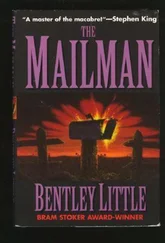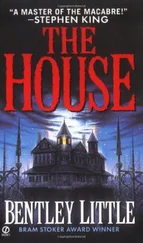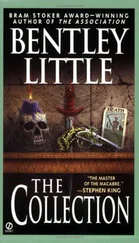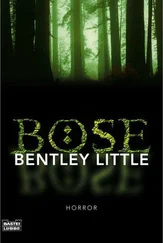It was Juniper's story exactly. Bill couldn't believe his good fortune.
This was what he'd been looking for, and he wished that Ben was here to read this with him. He printed out a hard copy, then sent Beck a message directly, typing out a description of The Store's doings in Juniper. He left out the weird stuff -- the deaths and disappearances -- but he described the arson at Richardson's store, and he explained the problems he'd run into trying to extricate his daughters from The Store's clutches. He also told Beck about what had happened to Ben.
After sending off the message, he printed copies of the rest of the mail in his in box, now up to eight messages. All were horror stories of dealings with The Store that had led to business failures or firings or lawsuits or other sorts of personal hardship.
Bill printed the last message, then checked his in box again. Sure enough, Beck had already sent a reply.
He eagerly called it up. The journalist expressed sympathy for Juniper's problems, said he understood what was going on, but he was not particularly encouraging about efforts to combat The Store.
"We tried," he wrote, "in our own little way, to fight The Store, but we were defeated. The outcome of our battle was a foregone conclusion. The Store is a powerful enemy."
Bill sent another message. "Any suggestions?" he typed.
The reply, when it arrived, was short and to the point: "Local, county, and state governments do not have the financial resources to fight The Store.
The federal government _should_ get involved, but interstate commerce regulations have been defanged over the past two decades and allocating resources to go after a major employer is not politically feasible in these antigovernment, pro-business times. You're on your own."
_You're on your own_.
The words jumped out at him, resonating in his brain. Beck had apparently tried going through the proper channels in his fight against The Store and had exhausted those possibilities, coming up a loser.
What was left? Using The Store's own tactics? Arson? Terrorism?
Bill stared for a moment at the screen. The journalist was obviously burnt-out and discouraged, but maybe there were other people out there, in other communities, with different backgrounds, who had ideas and suggestions.
He decided to try again, taking a different tack, posting another message on the bulletin board. "I am looking for information concerning activities and practices of the discount retail chain The Store," he typed. "Specifically, I am looking for ways to prevent The Store from completely taking over the town of Juniper, Arizona. If anybody has any ideas, please let me know."
He posted the message, the screen went blank for several seconds, then a one-line statement appeared: "This communication has been deleted."
What? He frowned. How could the message have been deleted? That made no sense.
He typed the words again, tried to post them on the bulletin board, and once more the statement "This communication has been deleted" appeared on his screen.
He thought of the Hispanic woman's claim that The Store was eavesdropping on her computer conversations, and he quickly fired off a note to Keith Beck, asking the journalist if anything like this had ever happened to him.
A new message appeared onscreen: "This communication cannot be transmitted. It is in violation of Paragraph 4 of your Freelink online service agreement."
Online service agreement?
He searched through the shelf above his desk until he found the box containing the diskettes and instruction book for Freelink. He took out the book, opened it, and before he could even find Paragraph 4, saw on the inside of the front cover, in tiny letters, words he had never noticed but that now sent a chill through his heart.
He immediately turned off his PC.
Mouth dry, heart pounding, he reread the notice inside the book's front cover: "Freelink is a subsidiary of The Store, Inc."
In his dream The Store was alive and sentient, walking around with giant brick legs, leaning over as it walked, looking behind other buildings, looking behind hills.
Looking for him.
2
There was a board meeting on Tuesday afternoon at five, and though Ginny usually attended meetings only during salary negotiations, word had come down that the district was going to be in dire financial straits next school year again -- and that layoffs were being considered.
Bill had been cloistered all day in his office, working, and she popped her head in and told him that he and the girls were on their own for dinner, she was going to the meeting. He nodded absently, and she wasn't sure he'd understood what she said, but she assumed he'd figure it out when his stomach started to growl, and she grabbed her keys from the bedroom and yelled an unanswered "Good-bye!"
The district offices were located in a flat stretch of weedy ground between the elementary school and the junior high. The small lot was already filled with other teachers' cars and trucks, so she parked in her usual spot at the elementary school and walked over.
The boardroom was crowded. All of the folding chairs were taken, and Eleanor Burrows and the other cafeteria and clerical workers were seated on too small plastic chairs that had been brought in from some classroom and arranged along the side aisle against the wall.
There were a few baby chairs left, but Ginny preferred to stand, and she moved to the left of the door, where two male high school teachers were already leaning against the cheaply paneled wall.
The board wasted no time in getting down to it. Immediately after calling the meeting to order, Paul Fancher, the superintendent, announced that unless drastic steps were taken, there would have to be wholesale teacher layoffs from all three schools. "We simply cannot afford to continue on as is," the superintendent explained.
"There goes our raise," someone said.
Nervous laughter greeted the remark.
"Now, we have several options," Fancher said. "Everyone can take an across-the-board ten percent pay cut --"
A chorus of angry words erupted from the gathered employees.
"I know," the superintendent said loudly. "I don't think that's fair, either. But that's one option we're considering. Another option is reducing services. Eliminating bus service, for example, and forcing parents to provide their children's transportation. Or we could eliminate selective positions and double up the workload for senior employees -- without overtime or additional compensation, of course." He paused. "Or we could privatize and contract out all non-teaching positions."
People were yelling at the board members now, all of whom were sitting in smug silence, watching and apparently enjoying the commotion caused by their plans.
Fancher raised his hands for silence. "These are hard choices we have to make for this coming school year." he said above the noise of the crowd. "That's why we're here today."
Ginny felt sick. She glanced over at Eleanor, who was in her late fifties and had been working for Juniper Elementary School since its inception. Most of the board members, Fancher included, were in their early thirties and had only moved to Juniper within the last five years. How dare they eliminate the jobs of people who had given the best years of their lives to Juniper's schoolchildren?
There was another man seated to the left of the board at the table in the front of the room, a youngish business-suited man who stared idly up at the ceiling, obviously bored. She did not know who he was, but there was a sinking feeling in the pit of her stomach, and she was pretty sure she knew whose interests the man represented.
Sure enough, after a heated discussion between Fancher, two other board members, and the most vocal employees in the audience, the superintendent called for order. He said a privatization proposal that should satisfy both sides had already been presented to the district by The Store.
Читать дальше












